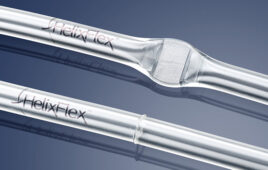
Michael Catania, vice president of product development, looks a patient samples in a cold storage area at Banyan Biomarkers Tuesday, Feb. 13, 2018, in San Diego. The company is developing a blood test to help doctors diagnose traumatic brain injuries. (AP Photo/Denis Poroy)
The first blood test to help doctors diagnose traumatic brain injuries has won U.S. government approval.
The move means Banyan Biomarkers can commercialize its test, giving the company an early lead in the biotech industry’s race to find a way to diagnose concussions.
The test doesn’t detect concussions and the approval won’t immediately change how patients with suspected concussions or other brain trauma are treated. But Wednesday’s green light by the Food and Drug Administration “is a big deal because then it opens the door and accelerates technology,” said Michael McCrea, a brain injury expert at Medical College of Wisconsin.
The test detects two proteins present in brain cells that can leak into the bloodstream following a blow to the head. Banyan’s research shows the test can detect them within 12 hours of injury. It’s designed to help doctors quickly determine which patients with suspected concussions may have brain bleeding or other brain injury.

Product development scientist Veronika Shevchenko works with patient samples at Banyan Biomarkers Tuesday, Feb. 13, 2018, in San Diego. (AP Photo/Denis Poroy)
Patients with a positive test would need a CT scan to confirm the results and determine if surgery or other treatment is needed. The test will first be used in emergency rooms, possibly as soon as later this year, but Banyan’s hope is that it will eventually be used on battlefields and football fields.
FDA Commissioner Dr. Scott Gottlieb said the test fits with the agency’s goals for delivering new technologies to patients and reducing unnecessary radiation exposure.
The test “sets the stage for a more modernized standard of care for testing of suspected cases,” Gottlieb said in a statement.
Traumatic brain injuries affect an estimated 10 million people globally each year; at least 2 million of them are treated in U.S. emergency rooms. They often get CT scans to detect bleeding or other abnormalities. The scans expose patients to radiation, but in many patients with mild brain injuries including concussions, abnormalities don’t show up on these imaging tests.
With Department of Defense funding, Banyan’s research shows its Brain Trauma Indicator can accurately pick up brain trauma later found on CT scans. It also shows that absence of the two proteins in the test is a good indication that CT scans will be normal. That means patients with negative blood tests can avoid CT scans and unnecessary radiation exposure, said Dr. Jeffrey Bazarian, a University of Rochester emergency medicine professor involved in Banyan’s research.

A patient sample at Banyan Biomarkers Tuesday, Feb. 13, 2018, in San Diego. (AP Photo/Denis Poroy)
Bazarian called the test “a huge step” toward devising a blood test that can detect brain injuries including concussions.
Dr. Walter Koroshetz, director of the National Institute of Neurological Disorders and Stroke, and other brain injury experts say the test isn’t sensitive enough to rule out concussions.
“This may be a beginning. It’s not the pot of gold at the end of the rainbow,” Koroshetz said.
That prize would be a test that could detect and guide treatment for concussions and traumatic brain injuries, similar to a blood test that hospitals commonly use to evaluate suspected heart attacks, Koroshetz said.
“That’s what we’d like to have for the brain,” he said.
San Diego-based Banyan has partnered with French firm bioMerieux SA to market the test to hospitals using bioMerieux’s blood analyzing machines.
Other companies are developing similar blood tests to detect brain injuries. Abbott has licensed both protein biomarkers from Banyan and is developing its own blood tests. BioDirection is developing a test involving one of the proteins in Banyan’s test plus another one and using a portable device that can yield results from a single drop of blood in less than two minutes.
Quanterix is also working to develop a blood test to diagnose concussions and other brain injuries. It has licensed the use of both proteins in Banyan’s test to be used with its own technology.
(Source: Associated Press)




